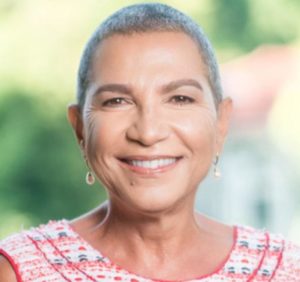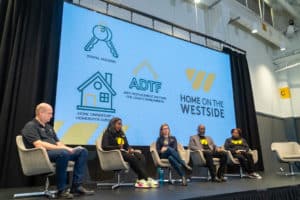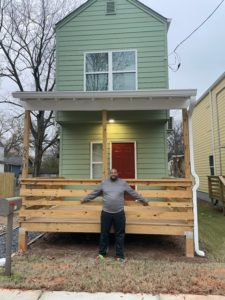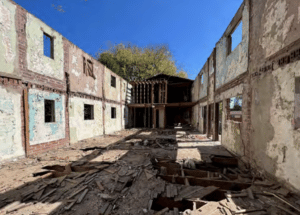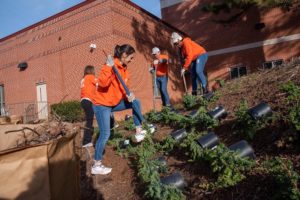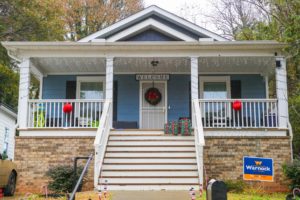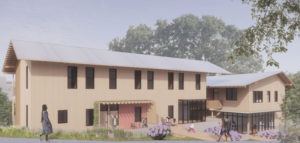While exploring the historic Westside, you’ll find Black history that made American history on nearly every block — including the streets you’re driving on. There are several streets in the community named after nationally prominent Black leaders from Atlanta, each of whom contributed to advancing civil rights and democracy for all Americans. While some names are more well known than others, each of them have made history worth knowing.
In honor of Black History Month, we are taking a trip down some of these iconic streets to learn more about their namesakes.
Martin Luther King, Jr. Boulevard
Today, almost every major city in the United States has a street named after the icon of the Civil Rights Movement, Dr. Martin Luther King, Jr. (1929-1968). His role guiding the movement cannot be overstated — Dr. King was the face of the fight for equality for Black Americans.
He was a scholar, having first graduated from Booker T. Washington High School in Westside Atlanta, and then earning degrees from Morehouse College, Crozer Theological Seminary and Boston University.
Dr. King moved to Alabama after meeting Corretta Scott, a native of Alabama also studying in the city. They got married and moved closer to her family in Alabama in 1953. He first worked as a pastor at Dexter Avenue Baptist Church in Montgomery, one of the most influential churches in the local Black community. During the following year, a series of segregated seating incidents on public buses led to the Montgomery Bus Boycott in 1956. King was a key leader in the movement, and by the end had gained national recognition.
Over the next decade, Dr. King led marches, sit-ins and protests across the country in the name of civil rights and equality. Alongside fellow luminaries, Dr. King co-founded the Southern Christian Leadership Conference (SCLC), a group that led the charge against racial segregation in the South. His leadership in the Civil Rights Movement led to tremendous achievements and pivotal legislative gains including the Civil Rights Act of 1964, Voting Rights Act of 1965, and the Fair Housing Act of 1968. On October 14, 1964, Dr. King won the Nobel Peace Prize for combating racial inequality through nonviolent resistance. In 1968, King was assassinated in Memphis, Tennessee.
In 1986, President Ronald Reagan established Martin Luther King, Jr. Day honoring his pivotal role in securing equal rights for Black Americans — and his legacy continues to inspire people to this day.
In 1976, Hunter Street would be renamed Martin Luther King Jr. Drive in Atlanta to honor the Civil Rights legend. The street ran directly through the area where Dr. King lived and learned, being home to landmarks where he ate, learned, prayed and planned his movements including Pascal’s restaurant, West Hunter Street Baptist Church and more.
Ralph David Abernathy Boulevard
Though only three years older, Reverend Ralph David Abernathy (1926-1990) is often referred to as a mentor of Dr. King. More importantly, he was Dr. King’s closest friend.
Abernathy was a Baptist minister at First Baptist Church in Montgomery, Alabama, the largest Black church in the city. He collaborated with Dr. King to form the Montgomery Improvement Association, the organization that went on to lead the Montgomery Bus Boycott. Rev. Abernathy later co-founded the Southern Christian Leadership Conference (SCLC) alongside Dr. King and other civil rights leaders. Rev. Abernathy assumed the role of president of the organization following Dr. King’s assassination.
Over the next two decades, Rev. Abernathy served as an advisory committee member of the Congress on Racial Equality (CORE), addressed the United Nations (UN) on the matter of world peace, brokered a deal between the FBI and American Indian Movement protestors during the Wounded Knee incident of 1973, and testified before the U.S. Congress in support of extending the Voting Rights Act in 1982.
Today, West Hunter Street Baptist Church, where Rev. Abernathy preached during his time in Atlanta, is under renovation.
Joseph E. Lowery Boulevard
Known as the “Dean of the Civil Rights Movement,” Reverend Joseph E. Lowery (1921-2020) started as a minister at the Warren Street Methodist Church in Mobile, Alabama, and later joined Dr. King in the fight for equality.
Rev. Lowery spearheaded the Alabama Civic Affairs Association, an organization dedicated to desegregation, and took part in the Montgomery Bus Boycott. Lowery, like Rev. Abernathy, was one of the co-founders of the Southern Christian Leadership Conference (SCLC). Rev. Lowery succeeded Rev. Abernathy as president in 1977. In addition to his involvement with the SCLC, Rev. Lowery also co-founded the Black Leadership Forum, a consortium of Black advocacy groups.
Following the end of the Civil Rights Movement, Rev. Lowery was a leading advocate for the end of apartheid in South Africa and he served as pastor of Cascade United Methodist Church in Atlanta from 1986 through 1992.
Donald Lee Hollowell Parkway
Formerly Bankhead Highway, this thoroughfare is named after famed civil rights attorney and activist Donald Lee Hollowell (1917-2004). Hollowell was pivotal in the effort to desegregate schools throughout the state of Georgia, leading lawsuits that would ultimately integrate Atlanta Public Schools and the state public universities including the University of Georgia in 1961.
Hollowell also acted as one of Dr. King’s personal attorneys, freeing him from prison in 1960. His work in Georgia garnered national recognition, and in 1966, he was appointed regional director of the Equal Employment Opportunity Commission (EEOC) by President Lyndon B. Johnson, becoming the first Black regional director of a major federal agency.
Joseph E. Boone Boulevard
Reverend Joseph E. Boone (1922-2006) was the head pastor of the Rush Memorial Congregational Church of the Atlanta University Center and a key figure of the Civil Rights Movement in Atlanta. Boone is best known for his leadership in launching the Atlanta Student Movement and working to integrate stores, restaurants and schools in the city.
Dr. King named Rev. Boone the chief negotiator of Operation Breadbasket, a program that encouraged businesses to employ Black Americans. Boone led a team of more than 200 ministers in more than 30 cities for the operation. Then-Governor Jimmy Carter appointed Boone to the Governor’s Council on Human Relations in 1971, and Boone would go on to be a leader in the business community with a focus on improving the economic development of Black communities.
James P. Brawley Drive
A brilliant academic, James P. Brawley (1894-1985) served as president of Clark College from 1941 to 1965. Brawley relocated Clark College to its current location in the Atlanta University Center and launched initiatives to advance the school’s programs. Brawley was a founding member of the United Negro College Fund (UNCF), an organization that helped raise funds for several new buildings to be added to the campus.
His leadership at Clark College paved the way for the establishment of a development office, a restructured curriculum that included a new pharmacy program that would become nationally renowned, as well as an expansion of the university grounds to include an athletic field and new academic buildings. By the end of Brawley’s tenure, the university was operating on a surplus with zero debt.


